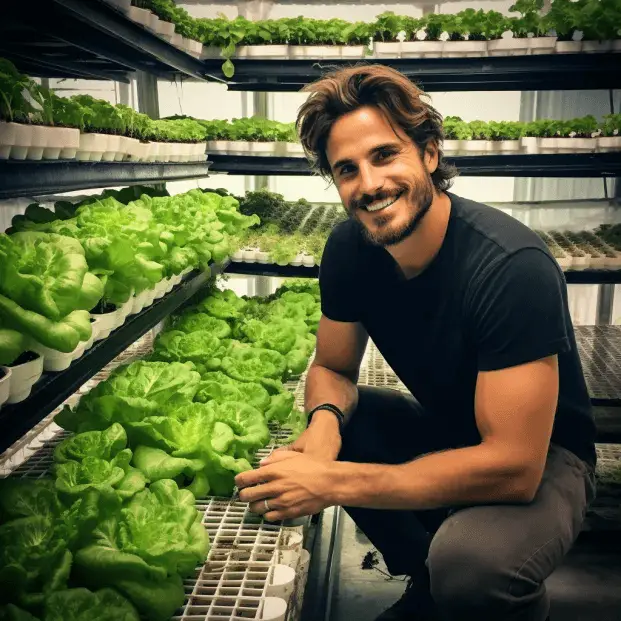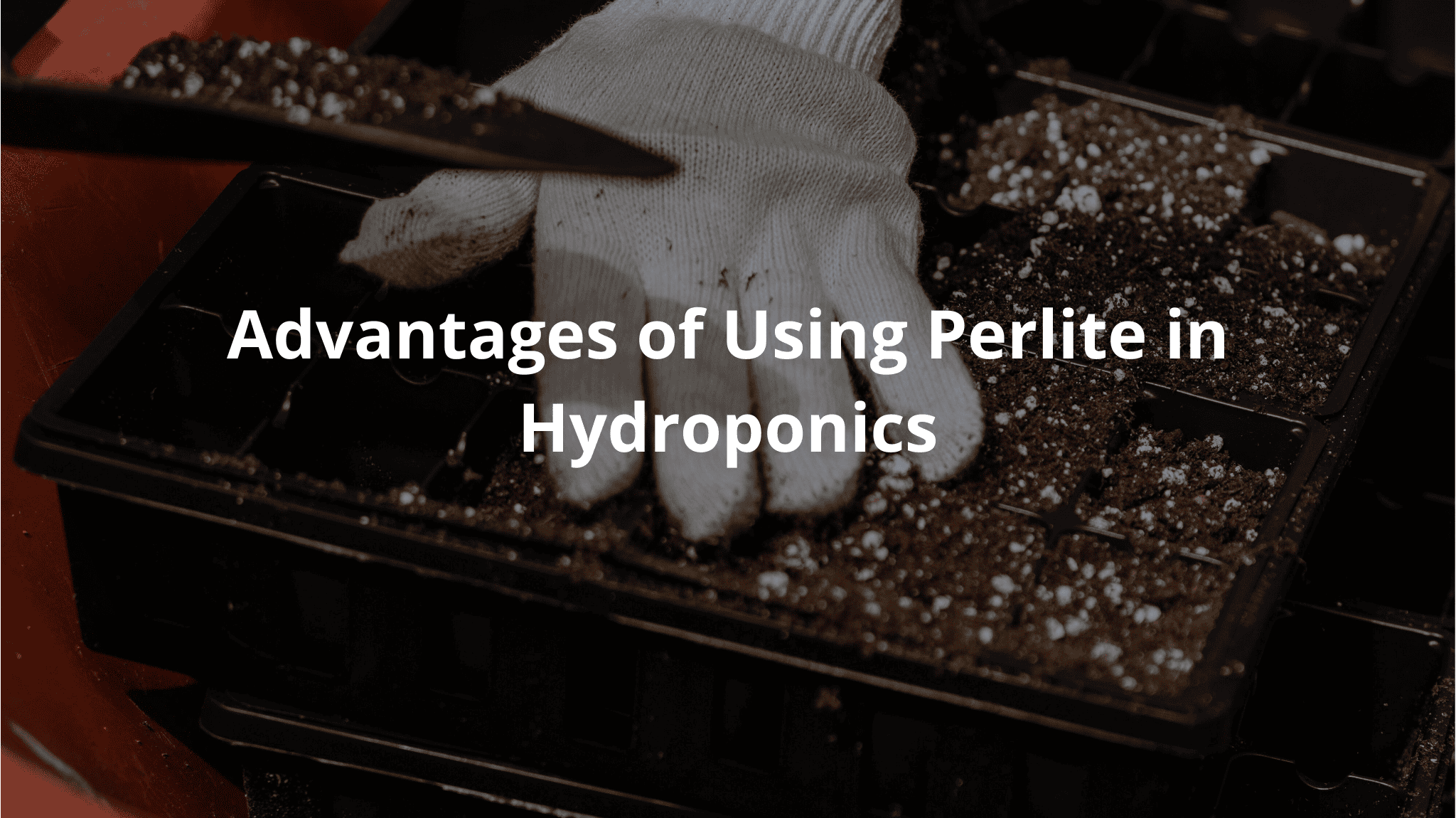Hydroponics is a cool way to grow plants without soil. Instead, plants get all their nutrients from water!
One popular choice for helping plants grow in hydroponic systems is perlite. It is a lightweight material that helps plant roots breathe and drink up water. Using perlite might be one of the best things a grower can do for their plants. Stick around to find out why!
Key Takeaway
- Perlite is light and easy to use in hydroponic systems.
- It helps plant roots get air and water without getting soggy.
- Using perlite can save money and help plants grow better.
Lightweight and Easy to Handle
Credits: Epic Gardening
Perlite is very light! It looks like a fluffy white rock made from volcanic glass. When someone tries it in their hydroponic garden, they might be surprised by how easy it is to carry. This is important, especially when using big pots or large hydroponic systems. Who wants to hurt their back lifting heavy things?
The lightness of perlite makes it a favorite for many growers. It works well for small home gardens and large farms! Its easy handling helps everyone enjoy their gardening experience more.(1)
Excellent Aeration and Drainage

One great aspect of perlite is how it supports plant roots in getting the air they need. Just like people, plants require air to breathe! If roots sit in water for too long, they can suffocate. Fortunately, perlite has tiny holes that allow air to flow through, which helps water drain away, keeping roots safe and happy.
- When someone grows tomato crops with perlite, they often observe strong, healthy root systems developing.
- This excellent aeration is a major reason many growers prefer using perlite.
- It prevents roots from becoming soggy and significantly enhances plant growth.
Using perlite can greatly benefit plants. It helps them breathe and stay healthy. So, if someone is planting anything, they should consider adding perlite to their soil mix!
Inert and Sterile
Perlite doesn’t break down over time. This is beneficial because it won’t mix with nutrient solutions. Other materials, like coconut coir, can decay and alter the nutrients, leading to more work for the grower.
- With perlite, the nutrient solutions remain stable, just as they should be.
- Additionally, it is sterile, so there’s no need to worry about bugs or diseases sneaking in.
- If someone encounters a pest problem in their garden, switching to perlite can help keep those pests at bay!
Using perlite keeps everything clean and straightforward. Growers can focus on their plants without extra concerns.
pH Neutrality
Perlite has a neutral pH. This means it won’t change how acidic the water is for plants. This is especially helpful for acid-loving plants like blueberries or cannabis.
- When someone sets up their hydroponic systems, knowing the pH will remain stable can provide peace of mind.
- This stability makes caring for plants much easier.
- Growers can concentrate on providing the best nutrient solutions without worrying about pH fluctuations.
With perlite, people can be confident that their plants are receiving what they need. It helps create a stable environment for healthy growth.
Water Retention and Conservation
Here’s a fun fact: perlite can hold water while still allowing air to flow in. This process is known as capillary action. It acts like a sponge that retains water without becoming too heavy.
- Many people discover that perlite has excellent water retention properties. This means they do not need to water their plants every day.
- Plants receive just the right amount of moisture to grow strong and healthy.
- This balance of water is crucial for plant health and helps prevent issues like root rot.
Using perlite can simplify plant care significantly. It helps keep plants happy without requiring extra effort from the grower!(2)
Versatility Across Hydroponic Systems
Perlite is an excellent choice because it fits into various hydroponic systems. Whether someone is using Ebb and Flow or Nutrient Film Technique (NFT), perlite can adapt to both methods seamlessly.
- Many people recall experimenting with different hydroponic setups and being impressed by how well perlite performs in each one.
- It serves as a dependable medium that consistently delivers positive results.
- Whether someone is a beginner just starting out or an expert with years of experience, perlite is a perfect choice for their hydroponic garden.
With perlite, growers can explore different techniques and still achieve great results. Its reliability and versatility make it a favorite among many gardening enthusiasts!
Cost-Effectiveness
For many growers, saving money is a top priority. Perlite stands out as a budget-friendly option. It costs less than many other growing mediums, making it an attractive choice for those who want to keep expenses low.
- Many people find bags of perlite at garden supply stores without spending too much.
- This cost-effectiveness appeals to growers aiming for maximum yield without high costs.
- With perlite, growers can cultivate healthy plants while staying within their budget.
Using perlite allows for savings while still achieving great results in the garden!
Long-term Stability and Reusability
Perlite can be reused! After some time, it can be cleaned and used again, making it a great choice for the environment.
- Many people have reused perlite in their gardens for several years, and it continues to perform just as well as when they first purchased it.
- This long-term stability means growers can maximize their investment in this growing medium.
- Additionally, with proper care and maintenance, hydroponic systems can remain effective for a long time.
Reusing perlite helps reduce waste and supports sustainable gardening practices. It’s a smart choice for anyone who wants to be eco-friendly while growing healthy plants!
Promotes Healthy Root Growth
Good roots mean good plants. Perlite plays a key role in helping roots grow strong by providing both air and moisture.
- Many people eagerly check on their plants because they can see how well the roots are developing in perlite.
- With perlite, they often notice their plants growing bigger and healthier over time.
- Healthy roots lead to better nutrient uptake, allowing plants to fully benefit from the nutrient-rich solutions provided.
Using perlite can significantly improve root health. Strong roots contribute to thriving plants, making it an essential choice for any gardener!
Good Electrical Conductivity
Perlite holds nutrients very well. This is important for plants because they need those nutrients to grow.
- It also maintains stable electrical conductivity, which helps plants absorb what they need more efficiently.
- Many people recall seeing their plants flourish with vibrant colors when they used perlite in their growing systems.
- The plants appeared happy and healthy, indicating that the growing conditions were optimal.
With good electrical conductivity, perlite helps create an ideal environment for plant growth. Healthy plants will surely show their appreciation to their growers!
Conclusion
Perlite is a fantastic choice for hydroponics. It’s lightweight, helps roots breathe, and is easy to reuse. Using perlite can bring out the best in plants, whether someone is growing tomatoes or cannabis. So, for those looking to improve their hydroponic setup, considering perlite might be the right move! It could be just what is needed for optimal plant growth.
FAQ
What makes perlite a popular choice as a hydroponic medium in hydroponic systems?
Perlite is a popular choice in hydroponic systems because it holds water well while also allowing air to reach the plant roots. This is important for healthy growth. It’s lightweight and easy to work with, helping to keep the right balance of water and air pockets that plants need to thrive.
How does perlite compare to other growing mediums like coconut coir and clay pebbles?
When compared to coconut coir and clay pebbles, perlite stands out for its ability to retain water while draining excess moisture effectively. Coconut coir holds moisture, but perlite’s capillary action allows better access to oxygen. This makes perlite an ideal choice for both larger plants and smaller setups in limited spaces.
Can perlite help with nutrient uptake in hydroponics systems?
Absolutely! Perlite helps plants take up nutrients better in hydroponic systems. Its structure allows water rich in nutrients to flow easily, making sure plant roots can access the minerals they need for strong growth. This means healthier plants overall.
How does the water retention capacity of perlite affect plant health?
Perlite’s ability to retain water is key for keeping plants healthy. It helps maintain the right moisture levels, so plants get enough water without drowning. This balance is crucial for preventing problems like root rot, which can harm or kill plants.
What are the environmental impacts of using perlite compared to organic materials like rice hulls?
Perlite has a lower environmental impact than some organic materials like rice hulls because it comes from volcanic rock and lasts longer. While organic materials break down over time and need replacing, perlite keeps its structure and can be reused after cleaning with a bleach solution or similar method. This makes it a more sustainable option for growers.
References
- https://www.perlite.org/the-role-of-perlite-in-hydroponic-culture/
- https://university.upstartfarmers.com/blog/perlite-in-hydroponics
Related Articles
- https://tophydroponicgarden.com/hydroponic-systems/
- https://tophydroponicgarden.com/easy-wick-hydroponics-system/
- https://tophydroponicgarden.com/grow-media/
Was this helpful?

I’m Barrie L., a passionate hydroponic gardening enthusiast dedicated to cultivating thriving, soil-less gardens. With a focus on all things hydroponic, I share my expertise on innovative growing techniques and sustainable practices through my blog, tophydroponicgarden.com. As a seasoned hydroponics specialist, my goal is to inspire and guide fellow gardeners in harnessing the power of water-based cultivation for bountiful and eco-friendly harvests. I’m also an author of the book “Hydroponics For Absolute Beginners: Your Step By Step Guide For How To Create An Hydroponics System At Home Without Soil, For Growing Vegetable, Fruit And Herbs.” which is sold on Amazon. Join me on a journey of redefining the way we cultivate plants, one nutrient-rich solution at a time. Happy growing!


